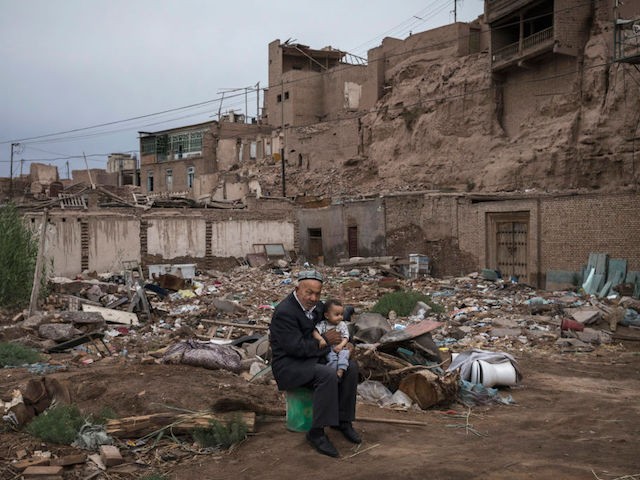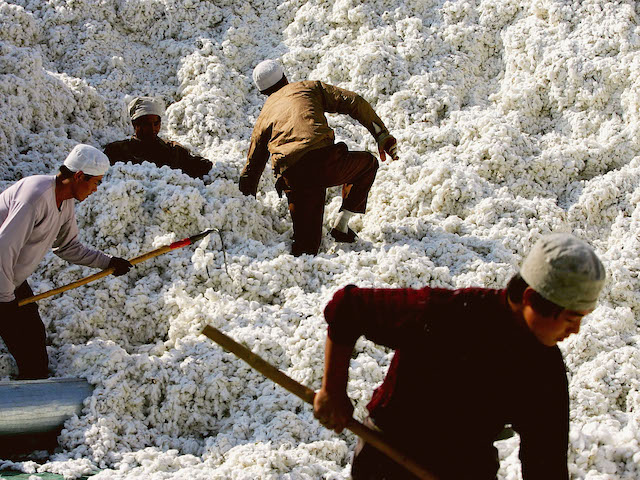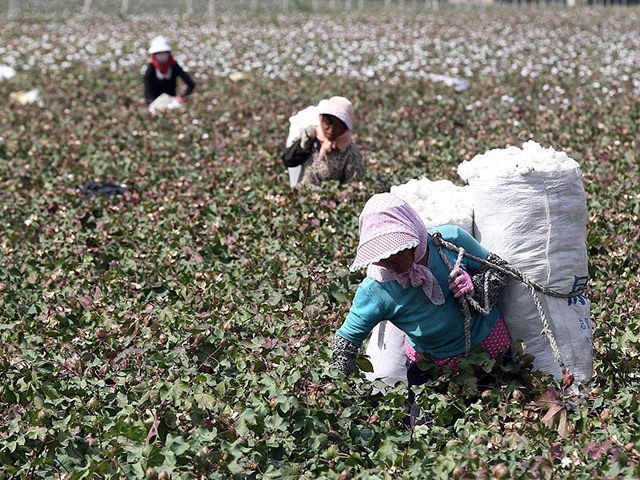This month’s implementation of the Uyghur Forced Labor Prevention Act – a law that requires companies to prove imports from the occupied Chinese region of East Turkistan were not produced by slaves – has triggered an outcry among companies insisting due diligence of supply chains to abide by the law is needlessly onerous, if not impossible.
Human rights advocates, U.S. Customs and Border Patrol, and experts in the field of forensic testing all agree that having full knowledge of a product’s supply chain, and avoiding the use of risky products from East Turkistan like cotton is not an insurmountable burden. The technology exists, and is widely accessible, for companies to test the raw materials used in their products to ensure they do not come from East Turkistan and thus, are highly likely to have been produced via slave labor.
China is currently engaging in a genocide of the Uyghur, Kazakh, Kyrgyz, and other non-Han ethnic groups in East Turkistan, which it refers to as its “Xinjiang province.” In addition to the use of concentration camps to indoctrinate and torture millions of civilians and the mass forced sterilization of women of “undesirable” ethnic backgrounds, extensive evidence compiled by human rights researchers suggests Chinese regime agents are also enslaving significant percentages of the population. Multiple studies published in the past three years indicate that the Chinese Communist Party is forcing Uyghurs and others to work picking cotton and selling Uyghur slaves to factories nationwide.

An ethnic Uyghur man holds his grandson as he sits outside his house in an area “waiting development by authorities” on June 28, 2017, in the old town of Kashgar, occupied East Turkistan. (Photo by Kevin Frayer/Getty Images)
The Uyghur Forced Labor Prevention Act only addresses slavery in East Turkistan. Signed into law by President Joe Biden in December, the law creates a government presumption that all goods coming from East Turkistan are tainted by forced labor. A company seeking to import those goods into the United States therefore must prove to the U.S. government that slave labor was not present anywhere in the supply chain that created the goods for Customs and Border Protection (CBP) to allow them into the country.
The law went into effect on June 21.
Prior to its passage, reports surfaced of multinational corporations like Apple and Nike, named among 83 companies in a 2020 Australian Strategic Policy Institute (ASPI) report identifying brands benefitting from Uyghur slave labor, lobbying Congress not to pass the law. The American Apparel and Footwear Association dramatically proclaimed the law would violate “U.S. jurisprudence and due process” and “do further harm to human rights” by creating a “blanket standard” that, as following murky Chinese supply chains was impossible, anything from Xinjiang is assumed to be made with forced labor.
Others have since objected that corporations would simply not have the resources to verify that they were not importing slave goods.
“Most companies do not have the resources or the sophistication or the leverage over their supply chains to gather reliable data,” Michael Littenberg, an attorney specializing in supply chain compliance, told Bloomberg law this week. “Even for very large companies, it’s a challenge.”
A CBP briefing prior to the enactment of the law for businesses interested in compliance resulted in a wave of “panicked” questions, according to Canada’s CBC, and complaints that the law makes companies “prove a negative”: that they are not profiting from slavery.
Some companies, like the retailer Reformation, have decided not to use cotton from China at all, fearing that simply moving the business a province away would not guarantee that Uyghur slave labor was not present in the supply chain.
“Unfortunately, it’s not even as simple as just saying that you’re not going to source within the XUAR [Xinjiang Uyghur Autonomous Region]. The opaque nature of supply chains in the region means it really has to be the entire country,” Kathleen Talbot, chief sustainability officer for Reformation told Fortune last year. Reformation announced it had stopped using cotton from anywhere in China.
Others, such as Disney, were importing “made in China” cotton products, like its LGBT pride collection, into the United States the same month the Uyghur Forced Labor Prevention Act went into effect. Disney representatives did not respond to a request for more information regarding the supply chain of its LGBT pride collection.
‘They’re Worried About Everything’
A source familiar with supply chain compliance in regard to Chinese products told Breitbart News that Disney likely has the resources to answer the question of where the cotton for its LGBT products originated.
“Disney could verify if its clothing has even a small amount of Xinjiang cotton through forensic testing,” the source said, noting that Disney had engaged in a similar operation in the past to avoid cotton tainted with forced labor from Uzbekistan.
Interest in DNA testing of cotton and other raw materials to ensure compliance with the Uyghur Forced Labor Prevention Act has skyrocketed, according to companies that provide the service.

Migrants work at a cotton factory on October 15, 2005 in Shihezi city of Xinjiang province, China. Attracted by the prospect of earning more, rural workers flow into the region to harvest the vast cotton fields. (Photo by Guang Niu/Getty Images)
“They’re worried about everything,” a representative for Applied DNA Sciences, a company that specializes in what it calls “molecular-based supply chain authentication,” told Breitbart News shortly before June 21.
“We can put a man on the moon, surely we can know where our cotton comes from,” Grant Cochrane, the CEO of forensic tracing company Oritain, told Breitbart News last week. “We work with a wide range of brands, if people want to know they can know.”
Oritain offers DNA testing for raw, organic materials that can tell a customer where that material came from. According to its global commercial director, Oliver Cock, the company has mapped out about 90 percent of the world’s cotton.
“We’re a forensic science origin verification business so what we do is we will take a raw material – any natural product, any agricultural product and then any animal that’s reared … and we establishment a fingerprint around that product,” Cock explained in conversation with Breitbart News, “that is unique to where that is actually grown.”
“The kind of question around, is it possible for companies to understand exactly where their cotton is from, the answer is yes, absolutely, because that’s what we do,” Cock asserted.
Like Applied DNA Sciences, Oritain has seen a “massive increase in interest” from companies seeking to clarify the origin of their products, Cock said.
“I think there is a growing interest in ensuring the provenance of where products come from, there is a growing interest in trying to make sure that they’re not buying product from risk regions,” he explained, “from brands, from consumers, from NGOs, from governments.”
‘If You Want to Know, You Can Know’
Oritain insists that its services are not unaffordable for many companies with the capacity to import raw materials from China, a point that challenges complaints from companies that laws like the Uyghur Forced Labor Prevention Act could lead to economic devastation.
“If you want to know, you can know, and it isn’t prohibitive by any stretch of the imagination because there is value in knowing it, and its absolutely possible,” Cock said. “The smaller businesses, you don’t have to do as many tests because their supply chains are smaller.”
Cochrane said the company strives to make its testing “accessible to everybody,” but DNA testing is not the only way for a company to be properly acquainted with its own supply chain.
“We are one solution but there are other solutions as well – so having an integrated supply chain, having relationships with your suppliers,” Cochrane explained, “there are a whole lot of things that are good predictors if you really want to know where your product comes from. And … it’s not just slave labor, it’s not just forced labor, it’s about deforestation, it’s about … global warming.”
“It’s really, really hard for people to deny that the origins of products is not important,” Cochrane emphasized.
Addressing businesses on June 17 in a press call, CBP Office of Trade Executive Assistant Commissioner AnnMarie Highsmith assured companies that CBP was setting companies up for success in complying with the Uyghur Forced Labor Prevention Act.
“Since the enactment of the Uyghur Forced Labor Prevention Act, CBP has taken a proactive approach to prepare for the implementation of the rebuttable presumption,” Highsmith said. “We have been leading communications to our stakeholders at a national level. We’ve held Webinars and industry meetings. We’ve got our Web site and guidance materials posted.”
“We brought together our best and brightest subject matter experts from across the agency to prepare for June 21st and to facilitate the operational transition,” Highsmith asserted.
Human rights activists have noted that the issue of the Chinese government using Uyghur people as slaves is far from new or surprising, leaving little room for shock from companies now required to abide by the new law.
“We are calling for due diligence on your supply chain – so you have to know your supply chain down to your sub- sub- sub-suppliers, down to your raw materials,” Louisa Greve, director of global advocacy for the Uyghur Human Rights Project (UHRP), told Breitbart News in an interview this month. “And that’s what the companies are all complaining about: ‘that’s impossible, you need to give us more time to comply.'”
“You’ve had two and a half years. You have all these highly paid lobbyists, they’re supposed to watch what is happening in Congress,” Greve noted. “You’ve had now more than two years to extricate your supply chain.”
Congress first heard testimony in October 2019 from UHRP founder Nury Turkel in which he warned that, in Xinjiang, “corporate supply chain due diligence is impossible.”
Greve noted that a law banning slave-made products has been in place for almost a century: the Tariff Act of 1930.


COMMENTS
Please let us know if you're having issues with commenting.